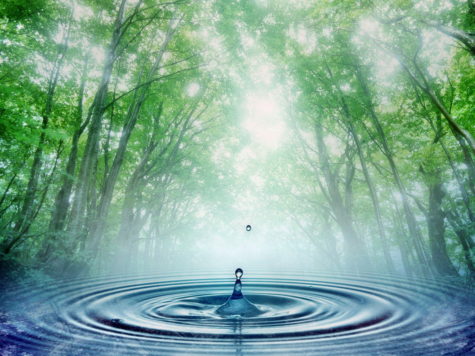Many assume that the term “Holy Water” indicates church-based water only. This is an oversimplification of a complex concept. The Roman Catholic Church did not invent the concept of Holy Water but adopted it from earlier Pagan use. Various Pagan shrines possessed virtually identical Holy Water fonts. Holy Water is a crucial component of many magical, religious and spiritual traditions, although what constitutes Holy Water and how it’s made varies greatly.
Water collected from the Jordan River, and water blessed by the church is considered Holy.
According to British folk tradition, rain falling on Holy Thursday – Ascension Day – may be gathered and used as Holy Water. Any other day held sacred to the spell caster may be substituted: Summer Solstice, May Eve, New Year’s, Samhain, your birthday, a saint’s day, etc.
Holy Water may also be made via astrological correspondences. Some believe that waters synchronized with a lunar eclipse or a Full Moon are holy and charged with extra magickal power.
Balinese tradition uses a variety of Holy Waters. These may include the water found within unripe coconuts or young bamboo. Ocean water is sometimes used as well.
Modern Wicca has evolved the notion of Holy Water. Various formulas exist. At it’s simplest, Witch’s Holy water is spring water with salt added. Different covens may have personal recipes, including infused herbs (rosemary, thyme, and vervain are particularly popular), or crystals.
Pow-Wow also features various recipes but the mainstay is water with salt and vervain added. Christian Pow-Wow may choose church-blessed waters instead.
Balinese Holy Water, Church-blessed Holy Water and Wiccan Holy Water (among others) are consecrated via sacred ritual: the ritual activates the water. Other magical traditions consider that the sacred, magical power of Holy Water is such that no further ritual or consecration is needed and may in fact be interference. Obtaining Holy Water may thus be as simple a gathering rainwater or adding sea salt to spring water. Complex rituals may also be designed.
Holy Water is most commonly used for:
- Cleansing and purification, both for individual bathing and for space-cleansing (sprinkle in corners).
- Altar cleansing and blessing.
- Healing spells.
- Holy Water is also believed capable of magically transmitting physical relief especially for headaches and tension. Use in compresses and massage.
- Cleansing and empowering materials and tools by either anointing them, or soaking them in the Holy Water.
- Exorcism and banishing spells.
A variety of recipes and rituals for making Holy Water can be found here:
- Book of Shadows – Full Moon Holy Water
- Magickal Apothecary – Holy Water
One Response to Holy Water
Leave a Reply
- Bean Magick and Lore by shirleytwofeathers - 6 Comments
- Purple Loosestrife Magick and Lore by shirleytwofeathers - 5 Comments
- Onion Magick and Lore by shirleytwofeathers - 4 Comments
- Magickal Uses of Mud Dauber Dirt by shirleytwofeathers - 4 Comments
- Herbs by Gender by shirleytwofeathers - 4 Comments
Michaela Renee Solomon: Bean Magick and Lore
Alex Jinn: Holy Water
Lilith Linlithgow: AZaJ2zpS1xg
Tina from Magickal Spot: Ingwaz Rune Magick
Tina from Magickal Spot: Thurisaz Rune Magick




Hello, I am new to the arts and would like to know the best ways to cast away Demons. I think I have been cursed.